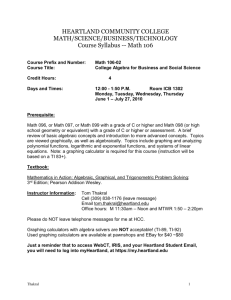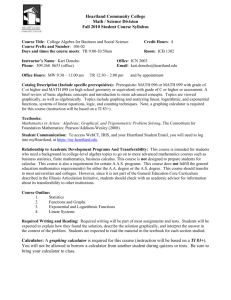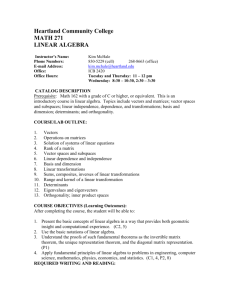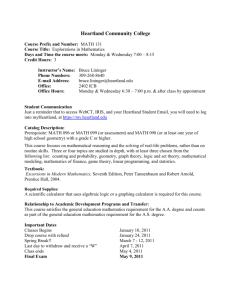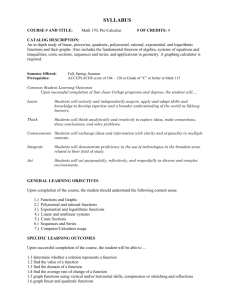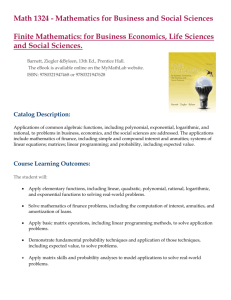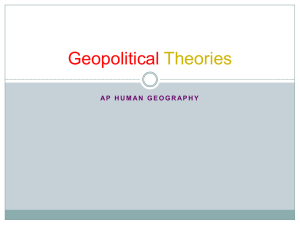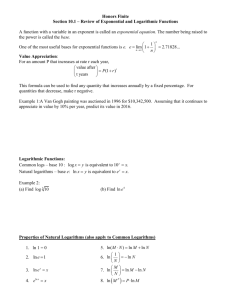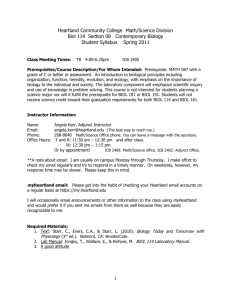MATH 109-01 Johnson (0216)
advertisement
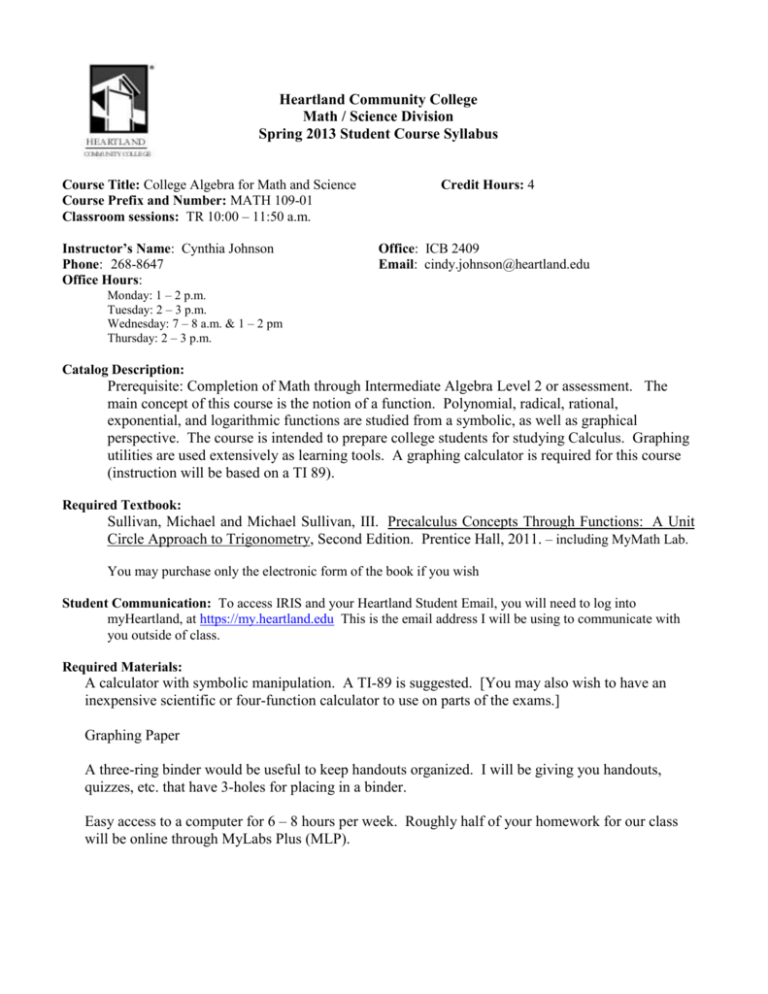
Heartland Community College Math / Science Division Spring 2013 Student Course Syllabus Course Title: College Algebra for Math and Science Course Prefix and Number: MATH 109-01 Classroom sessions: TR 10:00 – 11:50 a.m. Instructor’s Name: Cynthia Johnson Phone: 268-8647 Office Hours: Credit Hours: 4 Office: ICB 2409 Email: cindy.johnson@heartland.edu Monday: 1 – 2 p.m. Tuesday: 2 – 3 p.m. Wednesday: 7 – 8 a.m. & 1 – 2 pm Thursday: 2 – 3 p.m. Catalog Description: Prerequisite: Completion of Math through Intermediate Algebra Level 2 or assessment. The main concept of this course is the notion of a function. Polynomial, radical, rational, exponential, and logarithmic functions are studied from a symbolic, as well as graphical perspective. The course is intended to prepare college students for studying Calculus. Graphing utilities are used extensively as learning tools. A graphing calculator is required for this course (instruction will be based on a TI 89). Required Textbook: Sullivan, Michael and Michael Sullivan, III. Precalculus Concepts Through Functions: A Unit Circle Approach to Trigonometry, Second Edition. Prentice Hall, 2011. – including MyMath Lab. You may purchase only the electronic form of the book if you wish Student Communication: To access IRIS and your Heartland Student Email, you will need to log into myHeartland, at https://my.heartland.edu This is the email address I will be using to communicate with you outside of class. Required Materials: A calculator with symbolic manipulation. A TI-89 is suggested. [You may also wish to have an inexpensive scientific or four-function calculator to use on parts of the exams.] Graphing Paper A three-ring binder would be useful to keep handouts organized. I will be giving you handouts, quizzes, etc. that have 3-holes for placing in a binder. Easy access to a computer for 6 – 8 hours per week. Roughly half of your homework for our class will be online through MyLabs Plus (MLP). Page 2 of 10 Math 109: Spring 2013 Relationship To Academic Development Programs And Transferability: MATH 109 fulfills 4 semester hours of elective credit for the A.A. and A.S. degrees. It should transfer to most colleges and universities as an elective course. However, since this course is not part of either the General Education Core Curriculum or a baccalaureate major program described in the Illinois articulation Initiative, students should check with an academic advisor for information about its transferability to other institutions. Refer to the IAI web page for information as well at www.itransfer.org. LEARNING OUTCOMES: Course Outcomes General Education Outcomes Range of Assessment Methods Apply various techniques to solve different types of equations and inequalities: absolute value, radical, fractional, polynomial, exponential, and logarithmic. Throughout the semester, students will achieve the following General Education outcomes: Methods of evaluation may consist of, but are not limited to unit tests, quizzes, homework, project(s), and a comprehensive final exam. Define what a function is and graph certain functions in the Cartesian coordinate system using the ideas of symmetry, translations, reflection and stretching. Sketch the graphs and describe the special attributes of these function types: a. Polynomial functions b. Rational functions c. Radical functions d. Exponential functions e. Logarithmic functions Understand the relationship between a graph and translation from standard position. Understand the relationship between a function and its inverse, algebraically and graphically. Use graphing technology appropriately to achieve goals. Use mathematics to model real world situations by taking a problem statement and translating it into a mathematical statement or by analyzing trends in a set of actual data and generating a model that approximates this set of data. PS 2 PS 3 PS 4 CT 1 CT 2 CO 2 Math 109 Spring 2013 Page 3 of 10 COURSE OUTLINE: 1. 2. 3. 4. 5. 6. 7. Equations and Inequalities Functions and Their Graphs Polynomial Functions Rational Functions Radical Functions Exponential Functions Logarithmic Functions Required Writing And Reading: Required writing will be part of most assignments and tests. Students will be expected to explain how they found the solution, describe the solution graphically, and interpret the answer in the context of the problem. Students are expected to read the material in the textbook for each section studied, typically 10-15 pages per section. Methods of Instruction: Instructional methods will include group work, discussions and lectures that will emphasize conceptual understanding as well as manipulation skills. Assessment will be based on individual homework submissions, group assignments, online quizzes, unit tests and a final. Class Policies: Method Of Evaluation (Tests/Exams, Grading System): Grades will be given according to the following scale: 100 - 90% = A 89 - 80% = B 79 - 70% = C 69 - 60% = D = F Below 60% Grading will be based on homework, group assignments, quizzes, unit exams and a comprehensive final exam. No exams are dropped. The weighting of these components will be: Assessments & Quizzes Homework, Activities & Labs (Online, paper and in class) Unit exams Final exam Total 5% 10% 60% 25% 100% Course Structure: Other than class days when we are taking tests, class time will be divided into “lecture” and in class homework and activities. In addition, most classes will begin with an assessment or quiz. In order to take the assessment or quiz, you must be present in class when it is given. Page 4 of 10 Math 109: Spring 2013 Homework There will be online homework assigned every class period. You will be given 5 days to complete each assignment. A 10% penalty will be given for any online homework completed after the due date. [Only those problems completed after the due date will be penalized.] There will be periodic paper homework assignments. You have 2 late slips for paper homework. If you cannot turn in a paper homework assignment on time for any reason you will have a 0 for that assignment until you complete it and turn it in with a late slip. After receiving your assignment with a late slip, I will omit the assignment from your overall grade. So, the 0 will not count against your grade any longer. We will also be completing activities in class. There is no way to make up an in class activity. Unit Tests Test will be given 3 times throughout the class – as close as possible to the calendar attached. Tests will cover material from assessments, quizzes, homework, examples from class work and the exercises in the book. Questions on the test may ask you to combine concepts from different sections – or different units of the course. Every test after the first will include questions which review the material from previous tests. You must bring your own calculator to the test. You will not be allowed to borrow a calculator from either me or another classmate. Every test will include questions that you may only use a scientific calculator to solve. Testing Center Unless you make arrangements with me ahead of time, I will assume that you are taking the test in our classroom during our normal class period. Arrangements to take the test in the Testing Center may be made in person, by phone or by email, but must be made no later than the class period before the test. I do need you to remind me for every test! Tests taken in the Testing Center will be allowed an extra 30 minutes for completion. For those tests where there is a “Scientific Calculator” portion as well as a “Graphing Calculator” portion, you will need to sign in twice. Testing Center Policies: You will be required to provide a photo ID You will be asked for our class – Math 109, section 01 You will be asked for my name – Cindy Johnson! You are responsible for completing the test within Testing Center hours – in one sitting. No one will be allowed to finish a test once they have left the testing center. [Please refer to Heartland’s website for testing center hours – They do change!!] You need to have the test completed by the time the Testing Center closes on the same day as our classroom test. All other conditions for the test will remain the same. (I.e. whether you can use a calculator, whether a formula sheet is provided for you, etc.) Math 109 Spring 2013 Page 5 of 10 Final Exam: The final is comprehensive and will contain material from every unit of the course. I will replace any single test grade that is lower than your final grade with your grade on the final. Our final exam will be during our regular class time on May 14th . Make-Up Tests If you must be absent on the day of a test, you need to contact me as soon as possible. When you contact me, you must include an email address or phone number I can reach you at. This is because, if possible, we will make arrangements to have you take the test before I give it back to the rest of the class. In this case, the test will be graded the same as if you had taken it in class. If you cannot take the test before it is scheduled to be given back, we can replace the missing test with your average on the final. This can be done for one (1) test. If you miss a second test, it will be a zero toward your final grade. Class Absences Attendance for our class is essential. If you must be absent, you may complete any paper homework by going online to MyLabs Plus and downloading the assignment. You are responsible for completing and turning the assignment in on time. There are no make ups for assessments, quizzes and in class activities if you miss them. Grade Reporting I will be using the gradebook on MyLabs Plus for recording and compiling your grades. Missing work – homework, assessments, quizzes or tests, will be counted as 0’s toward your overall grade in the course. However, because of limitations of the system, those 0’s will only show up as 0’s on your final course grade. Extra Credit Philosophy Because of the nature of this class and the importance of students having a solid foundation in this courses material for future coursework, my policy is to not offer extra credit. If, under unforeseen circumstances, something comes up that warrants extra credit, points will be offered only if the situation allows me to offer the opportunity to the entire class. Syllabi disclaimer This syllabus is subject to change. Any changes will be announced in class and posted as announcements in MyLabs Plus. Page 6 of 10 Math 109: Spring 2013 Proposed Schedule: The schedule will be completed when the class has chosen the other units. Changes will be announced in class and posted on MLP. Wk Dates Bk Sec Topics th th 1 Jan 14 – Jan 20 1.1 – 1.3 Functions; Graphs of Functions; and Properties of Functions 2 Jan 21st – Jan 27th 1.4 – 1.5 Library of Functions; Piecewise-defined Functions; Graphing MLK Holiday Techniques: Transformations 3 Jan 28th – Feb 3rd 1.6 – 1.7, 2.1 Mathematical Models: Building Functions; Building Mathematical Using Variation; Properties of Linear Functions and Linear Models 4 Feb 4th – Feb 10th 2.2; Review Building Linear Models from Data 5 Feb 11th – Feb 17th Test 1 2.3 Quadratic Functions and Their Zeros th th 6 Feb 18 – Feb 24 2.4 – 2.6 Properties of Quadratic Functions; Building Quadratic Models from Verbal Descriptions and from Data 7 Feb 25th – Mar 3rd 2.7 – 2.8, 3.1 Complex Zeros of a Quadratic Function; Equations and Inequalities Involving the Absolute Value Function; Polynomial Functions and Models 8 Mar 4th – Mar 10th 3.1 (cont) 3.5 Polynomial Functions and Models; The Real Zeros of a Polynomial Function Mar 11th – Mar 17th Spring Break th th 9 Mar 18 – Mar 24 3.6; Review Complex Zeros; Fundamental Theorem of Algebra 10 Mar 25th – Mar 31st Test 2 3.2 Properties of Rational Functions 11 Apr 1st – Apr 7th 3.3 – 3.4 The Graph of a Rational Function; Polynomial and Rational Inequalities th th 12 Apr 8 – Apr 14 4.1 – 4.2 Composite Functions; One-to-one Functions; Inverse Functions 13 Apr 15th – Apr 21st 4.3 – 4.4 Exponential Functions; Logarithmic Functions 14 Apr 22nd – Apr 28th Properties of Logarithms; Exponential and Logarithmic 4.5 – 4.6 Equations th th 15 Apr 29 – May 5 Financial Models; Exponential Growth and Decay Models; 4.7 – 4.9; Review Newton’s Law; Logistic Growth and Decay Models; Building Exponential, Logistic and Logarithmic Models from Data 16 May 6th – May 9th Test 3; Review Final Exam: Tuesday, May 14th from 10 to 11:50 a.m. in our classroom Math 109 Spring 2013 Page 7 of 10 General Information for Students Testing Services (located in Student Commons Building 2001) Testing Services provides a secure testing environment for students who are enrolled in online, hybrid, and other distance learning courses; have a documented disability; or need to take a make-up exam. Testing accommodations for students having documented disabilities must be arranged by the student through Disability Support Services. Testing Services will only administer exams at the request of the instructor. For more information, please call (309) 268-8050. Counseling Services Counseling Services provides confidential and professional counseling for both emergency and personal issues. Services also include referrals to local community resources and support for students on academic probation. For more information, please call (309) 268-8318. Services in Academic Support Center (Raab Road campus) Library The Library provides fast and free access to credible information from a full range of resources including books, online journals, videos, newspapers, online music, class reserves, and interlibrary loan. Individualize research by appointment or come in anytime. See the Library tab in myHeartland, email library@heartland.edu or call (309) 268-8292 for details. Tutoring Services Tutoring Services provides tutoring in various forms at no cost to Heartland students in Normal, Pontiac, and Lincoln. Tutors are available at convenient times throughout the week. Study groups are also available by request. For more information about services available at each location, please call (309) 268-8231 (Normal), (815) 842-6777 (Pontiac), or (217) 735-1731 (Lincoln). Disability Support Services Disability Support Services (DSS) ensures that students with disabilities have equal access to the college’s programs, services and activities through the provision of reasonable accommodations as mandated in Section 504 of the Rehabilitation Act and the Americans with Disabilities Act. DSS offers a wide range of services to support students with disabilities, including: assistive technology, document conversion services, personnel, classroom and testing accommodations. Students with a documented disability who wish to discuss academic accommodations should call (309) 268-8259 for details. Open Computing Lab The Open Computing Lab provides free computing for HCC students at convenient times throughout the week. The computer lab is staffed by trained Lab Assistants and offers the use of approximately 70 computers, a scanner, a laser printer, and an electric typewriter. Writing Lab The Writing Lab provides guidance for writers on assignment comprehension, critical thinking and the stages of the writing process. The Writing Lab is staffed by English faculty and Tutors with years of Page 8 of 10 Math 109: Spring 2013 experience working with students on writing. In every session, supportive staff work with writers to explore and develop their own ideas as appropriate to the needs of their readers and to learn the rhetorical strategies necessary for effective communication. For more information, please call (309) 268-8231. Services in Community Commons Building, first floor (Raab Road campus) Academic Advising Academic advisors help students develop a plan of study, review degree/program requirements, discuss transferability of courses, and provide career exploration support. For more information, please call (309) 268-8033. Academic Advising services are also available at the Lincoln and Pontiac sites. Career Services Career Services assist students to determine career goals, develop employability and job search skills and connect with potential employers in preparation for employment and career transitions. Through the Online Career Center at www.collegecentral.com/heartland students can learn about area employment opportunities, prepare and post resumes and find a host of free career-related resources. The job shadow and internship programs offer access to relevant work-based learning opportunities that enhance academic experiences and support students in their career pursuits. For more information, please call (309) 268-8034 or email Career.Services@heartland.edu. Financial Aid Office The Financial Aid Office provides information on programs and types of financial aid available to students. For more information, please call (309) 268-8020. Transcripts (Located in Student Commons Building 1000) Official and unofficial transcripts may be obtained in the Student Records Office. Transcripts may also be obtained at Heartland’s Lincoln and Pontiac sites. Official transcripts must be requested in writing. The form is available online (http://www.heartland.edu/transcripts/index.jsp) or in the Student Records Office. Unofficial transcripts are available to print online through IRIS. Academic Integrity and Plagiarism Academic Integrity Academic integrity is a fundamental principle of collegial life at Heartland Community College and is essential to the credibility of the College’s educational programs. Moreover, because grading may be competitive, students who misrepresent their academic work violate the right of their fellow students. The College, therefore, views any act of academic dishonest as a serious offense requiring disciplinary measures, including course failure, suspension, and even expulsion from the College. In addition, an act of academic dishonesty may have unforeseen effects far beyond any officially imposed penalties. Violations of academic integrity include, but are not limited to cheating, aiding or suborning cheating or other acts of academic dishonesty, plagiarism, misrepresentation of data, falsification of academic records or documents and unauthorized access to computerized academic or administrative records or systems. Definitions of these violations may be found in the college catalog. Math 109 Spring 2013 Page 9 of 10 Plagiarism Plagiarism is the presenting of others’ ideas as if they were your own. When you write a paper, create a project, do a presentation or create anything original, it is assumed that all the work, except for that which is attributed to another author or creator, is your own. Plagiarism is considered a serious academic offense and may take the following forms: Copying word-for-word from another source and not giving that source credit. Paraphrasing the work of another and not giving that source credit. Adopting a particularly apt phrase as your own. Using an image or a copy of an image without crediting its source. Paraphrasing someone else’s line of thinking in the development of a topic as if it were your own. Using another person’s project or another person’s work as if it were your own. [Adapted from the Modem Language Association’s MLA Handbook for Writers of Research Papers. 7th ed. New York: MLA, 2009:51-61] Note that word-for-word copying is not the only form of plagiarism. The penalties for plagiarism may be severe, ranging from failure on the particular piece of work, failure in the course or expulsion from school in extreme cases. Many plagiarism problems can be remedied by citing the sources of the original work. When in doubt, cite the source according to the style your instructor directs. Usually this is APA or MLA Style. Don’t be daunted by citing sources which are not books. You can cite everything, including pamphlets, maps, cereal boxes, telephone conversations, movies, television shows, Internet and world-wide web sites. Page 10 of 10 Math 109: Spring 2013 Philosophy of Grades The Heartland Community College grading philosophy grows out of our vision of educational excellence. This common philosophy provides a framework for each academic division and instructor as they establish their own individual course grading system, evaluation methods, and course policies using the shared general rubrics for letter grades given below. Letter grades serve as a vehicle to promote meaningful evaluation of student achievement, to inform students of academic progress, and, as necessary, to improve student performance, habits, and practices. Using a letter grade as a prerequisite for subsequent courses means we believe that the grade was assigned through a conscious judgment about a student’s readiness to proceed to more advanced study. At Heartland, students’ academic achievement is measured by their mastery of course objectives and content. We challenge students to meet these recognized standards of achievement and we assign grades based on their success in doing so. Simply stated, we believe that the responsibility for academic achievement rests with the student and that holding students responsible for their learning promotes their academic growth. Letter Grade Rubrics “A” This grade represents consistently outstanding performance that demonstrates superior understanding and skillful use of important course concepts. Performance at this level signifies that the student is extremely well prepared to continue with more advanced study of the subject. “B” This grade represents performance significantly beyond the level necessary to achieve the course objectives. Work is of high quality but not consistently at an outstanding level. Performance at this level signifies that the student is well prepared to continue with more advanced study of the subject. “C” This grade represents an acceptable achievement of the course objectives. Performance at this level signifies that the student is reasonably well prepared to continue with more advanced study of the subject. “D” This grade represents less than adequate performance. It signifies questionable readiness to proceed with more advanced study of the subject. “F” This grade reflects unacceptable performance. The student is not yet ready to proceed with more advanced study of the subject, and must repeat the course successfully to receive credit.
